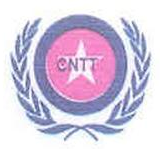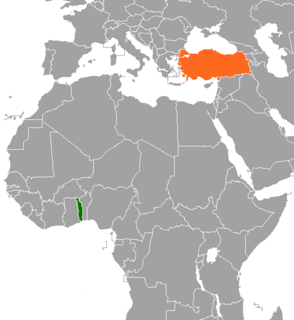Related Research Articles

Togo, officially the Togolese Republic, is a country in West Africa. It is bordered by Ghana to the west, Benin to the east and Burkina Faso to the north. The country extends south to the Gulf of Guinea, where its capital and largest city Lomé is located. Togo covers 57,000 square kilometres, making it one of the smallest countries in Africa, with a population of approximately 8 million, as well as one of the narrowest countries in the world with a width of less than 115 km (71 mi) between Ghana and its eastern neighbor Benin, which is also quite narrow, except for its northern parts.
The history of Togo can be traced to archaeological finds which indicate that ancient local tribes were able to produce pottery and process tin. During the period from the 11th century to the 16th century, the Ewé, the Mina, the Gun, and various other tribes entered the region. Most of them settled in coastal areas.. The Portuguese arrived in the late 15th century, followed by other European powers. Until the 19th century, the coastal region was a major slave trade centre, earning Togo and the surrounding region the name "The Slave Coast".

The economy of Togo has struggled greatly. The International Monetary Fund (IMF) ranks it as the tenth poorest country in the world, with development undercut by political instability, lowered commodity prices, and external debts. While industry and services play a role, the economy is dependent on subsistence agriculture, with industrialization and regional banking suffering major setbacks.

Lomé is the capital and largest city of Togo. It has an urban population of 837,437 while there were 1,477,660 permanent residents in its metropolitan area as of the 2010 census. Located on the Gulf of Guinea at the southwest corner of the country, with its entire western border along the easternmost point of Ghana's Volta Region, Lomé is the country's administrative and industrial center, which includes an oil refinery. It is also the country's chief port, from where it exports coffee, cocoa, copra, and oil palm kernels.

The General Confederation of Labour is a national trade union center, founded in 1895 in the city of Limoges. It is the first of the five major French confederations of trade unions.

The National Confederation of Togolese Workers (CNTT) is a national trade union center in Togo. It was created in January, 1973 and included the Union Nationale des Travailleurs du Togo (UNTT) and the Confédération Syndicale des Travailleurs du Togo (CSTT), both of whom had been dissolved by the government in 1972.
The Trade Union Confederation of Togolese Workers (CSTT) is a national trade union center in Togo. It is affiliated with the International Trade Union Confederation.

Muslims in Togo represent over 30% of the national population. Islam came to Togo about the same time as it did much of West Africa. The vast majority of Muslims in Togo are Sunni of Maliki school of jurisprudence.

The Central Bank of West African States is a central bank serving the eight west African countries which share the common West African CFA franc currency and comprise the West African Economic and Monetary Union (UEMOA):
The Togo national rugby union team represents Togo in international rugby union. Togo are a member of the International Rugby Board (IRB), and have yet to play in a Rugby World Cup tournament. Togo played their first international in 2001, losing to Nigeria. They won their first match in 2003, defeating Mauritania.

Togo–United States relations are bilateral relations between Togo and the United States.
The Benin national rugby union team represents Benin in international rugby union. Benin is not a member of the International Rugby Board (IRB), and have yet to play in a Rugby World Cup tournament.
Education in Togo is compulsory for six years. In 1996, the gross primary enrollment rate was 119.6 percent, and the net primary enrollment rate was 81.3 percent. Primary school attendance rates were unavailable for Togo as of 2001.
Rugby union in Togo is a minor but growing sport.
The Confédération africaine des travailleurs croyants was a trade union confederation in French West Africa and Togo. C.A.T.C-A.O.F-Togo was founded in Ouagadougou July 8–15, 1956 by the West African branches of the French trade union centre C.F.T.C. David Soumah became the first president of C.A.T.C-A.O.F-Togo.

India–Togo relations refers to the international relations that exist between India and Togo.
Trade unions in Togo first emerged under French colonial rule in the 1930s and 1940s. In the 1950s, unions separated from French structures as autonomous organisations. Following independence in 1960 there remained a pluralistic environment, however, with the military coup of Gnassingbé Eyadéma in 1968, all trade unions were dissolved into a single union under state control. This situation remained until the early 1990s when trade union plurality returned.

Togo–Turkey relations are the foreign relations between Togo and Turkey. Turkey embassy opened in Lomé.

Togolese nationality law is regulated by the Constitution of Togo, as amended; the Togolese Nationality Code, and its revisions; the Code of Persons and Family; the Children's Code; and various international agreements to which the country is a signatory. These laws determine who is, or is eligible to be, a national of Togo. The legal means to acquire nationality, formal legal membership in a nation, differ from the domestic relationship of rights and obligations between a national and the nation, known as citizenship. Nationality describes the relationship of an individual to the state under international law, whereas citizenship is the domestic relationship of an individual within the nation. Togolese nationality is typically obtained under the principal of jus sanguinis, i.e. by birth in Togo or abroad to parents with Togolese nationality. It can be granted to persons with an affiliation to the country, or to a permanent resident who has lived in the country for a given period of time through naturalization.
References
- ICTUR; et al., eds. (2005). Trade Unions of the World (6th ed.). London, UK: John Harper Publishing. ISBN 0-9543811-5-7.